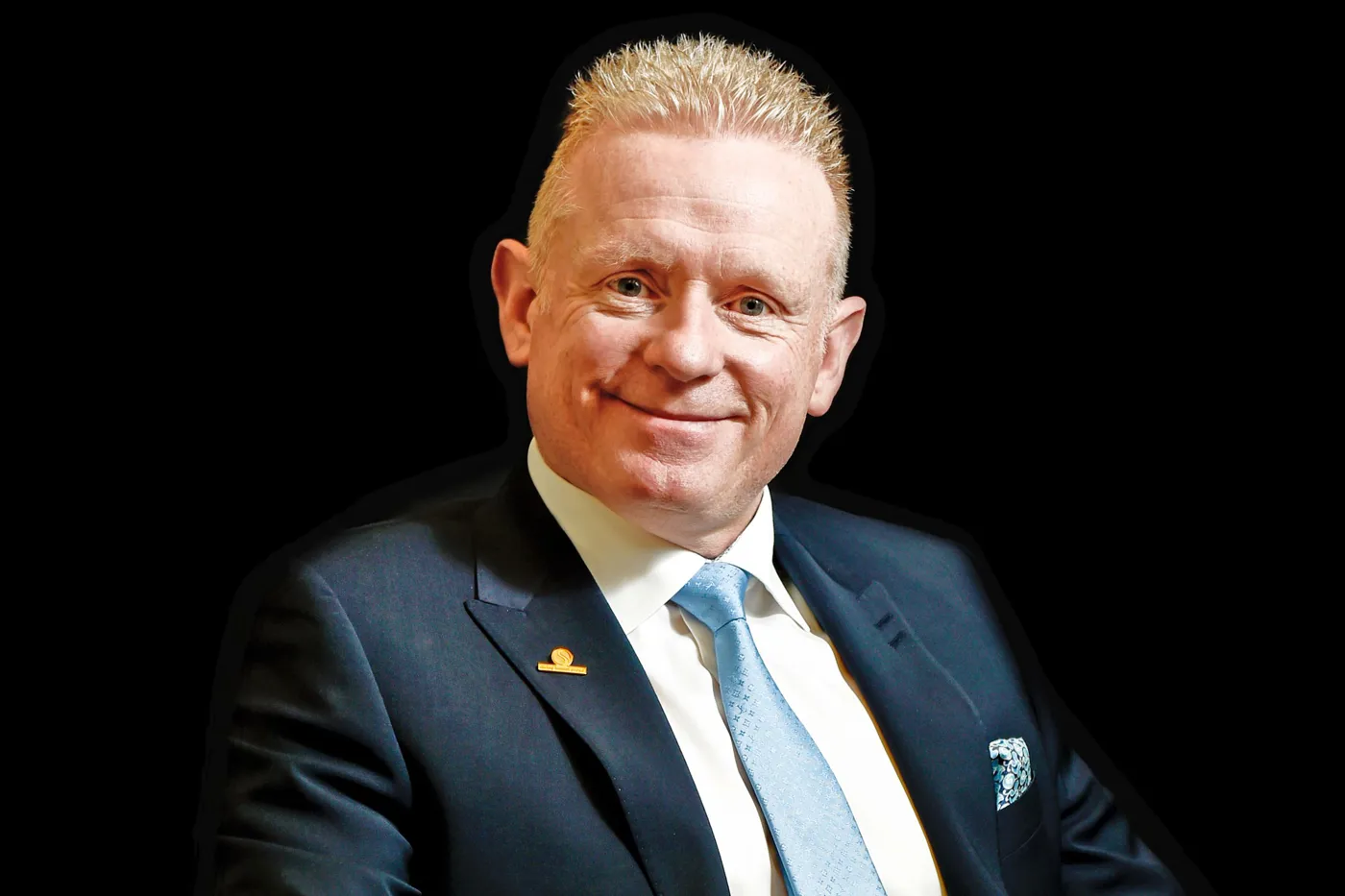As turnover rises, profits stall and workshops become cluttered with low-margin warranty work, there is a sense at Swansway Group that the UK motor retail industry is entering a state of flux.
Although Swansway acquired three Audi and three Volkswagen Group TPS sites in December, it now intends to enter a “period of consolidation”. In a second half that could yet deliver a rocky end to 2017, it is refocusing on the basics and making stability a priority.
In his office at Swansway’s Crewe headquarters, director Peter Smyth – one of three Smyth brothers on the Swansway board, along with David and John – produces a laminated copy of a story that has become something of a mantra.
Smyth acknowledges the “hot dog story” can be found with a quick Google search, but said he read it often as Swansway weathered the 2008 recession – during which the business’s profit before tax figure fell 98.6% year-on-year, to £18,000.
The story tells of a successful hot dog seller whose business fails when he is prompted to cut corners after his “more worldly” son tells him the country is in recession.
Smyth said: “It’s an important lesson. Changing the way you do things in a downturn can create a self-perpetuating situation. Times are very uncertain at the moment, but we weathered the 2008 recession by sticking to straightforward principles and we have to do the same this time around.”
Echoing his video address to guests at this year’s AM100 Dinner, Smyth acknowledged that some dealers face a tough time in H2. He expects many to exhaust the proceeds of a buoyant Q1 as they look to bolster faltering performance.
He said: “This year so far has been a game of two halves. In the first half, we went out and scored a hat-trick. We were able to sell a lot of cars without having to pre-register and part of that was because of the changes in vehicle excise duty.
“Since then, Brexit negotiations have got nearer, we have had a debacle of a general election and there is huge uncertainty out there.
“The targets that we were set in the second quarter have undoubtedly been more challenging and what manufacturers have not done… is given us the tools to do the job.”
Smyth said “sensible” car dealers “made great profits in quarter one”, and then “held a little bit back to seep into quarter two”.
“But by the end of quarter two, I think their ‘up the sleeve’ money will have gone.”
Sales rise as margins fall
Smyth said Swansway’s H1 profits were up about £500,000 year-on-year, but said it “doesn’t feel that way because we’re working harder”.
The group will want to see profits rise in 2017 – last year, its turnover rose 15.3% (to £557.9 million, from £472.6 million in 2015), but profit before tax fell 6.1% to £5.2m (following a goodwill write-off of £289,000, it was down from £6.2m in 2015).
The group sold 16% more new and used vehicles in 2016 (13,500 new and 10,000 used), but return on sales was 0.3 percentage points lower, at 1%.
Swansway expects turnover to rise to about £750m in 2017, after it added sites in 2016 and revamped its used car sales.
It acquired Bolton’s Gordons Honda operation in November 2015 and 2016’s accounts show the group took advantage of £23.52m in new loans as it added a multi-franchise (Citroën, Alfa Romeo, Abarth, Fiat and Jeep) operation in Chester and a £5.5m new standalone Jaguar showroom in Crewe. It opened a standalone Land Rover facility in Stafford in January 2015.
The acquisition of Thompson Motor Group doubled its Audi representation, adding showrooms in Preston, Blackburn and Carlisle along with Volkswagen TPS centres in the same areas. The deal was facilitated by a £250,000 loan from Volkswagen UK and three loans amounting to £4.72m from Volkswagen Bank United Kingdom.
The group has also re-branded its Swansway Select used car operation as Motor Match, supported by a new website, launched in August 2016, that brought together 22 separate group-wide sites.
Despite visitor numbers falling in the 12 months since its launch (83,000 in December 2016, compared with 110,000 in December 2015), Motor Match has become a proven lead generator. Enquiries via the platform rose 55% from 8,619 a month in December 2015 to 18,980 a year later.
Swansway’s accounts show the Stafford Land Rover business made a “very satisfactory return” in 2016. Its profits trebled in its second year of operation, after it was named Land Rover Dealer of the Year and Land Rover Aftersales Dealership of the Year.
Swansway reported that its Seat dealership was unprofitable ahead of the arrival of the Ateca SUV and new versions of the Leon and Ibiza, with Honda slightly behind 2015’s performance. The FCA Group brands and Citroën were “behind expectations” and Audi and Volkswagen operations were in line with 2015, it said.
Peter Smyth’s hot dog story is at odds with the path to success of his father, Michael, who was inducted into the AM Hall of Fame at February’s AM Awards (Swansway also won the Excellence in Aftersales award).
Michael Smyth started business as a door-to-door washing machine salesman before investing in a garage and petrol forecourt and later moving into car retail with the opening of a Toyota franchise (which later became Europe’s largest Toyota/Lexus operation) in 1967.
However, far from sticking to one line of business, Michael founded the service plan specialist Emac and also built up Elton Vehicle Contracts to become the UK’s largest privately owned leasing company before its acquisition by Abbey National. He sold his previous group, the £160m turnover RRG, to Japanese investors Marubeni Corporation in 2000.
Swansway’s business remains diverse. The group’s portfolio includes Hardy Mill Properties, a property business, and Stable Vehicle Contracts, a contract hire business that has thrived on the back of lofty manufacturer sales targets and a bonus-driven retail market in recent years.
Peter Smyth said: “A broker flourishes when there is oversupply in the market because the broker will approach the dealer group, which has whopping great targets to get the bonuses that the dealer has probably included in his management accounts up to the end of the quarter. They are prepared to sell cars at below cost.
“Our brokerage businesses are not branded as Swansway and while it supplies our own branded vehicles, we supply less than 20% to them – 80% come from other, larger dealer groups.
“There is oversupply in the market and that’s very short-sighted of the manufacturer, because they actually lose contact with who the actual customer is.”
 Smyth said the face of the premium car customer is changing into a “promiscuous consumer” who is not interested in a particular brand, but simply wants to drive a car that fits their monthly budget.
Smyth said the face of the premium car customer is changing into a “promiscuous consumer” who is not interested in a particular brand, but simply wants to drive a car that fits their monthly budget.
He is a supporter of the PCP finance product, which has attracted negative publicity recently (see ‘Dealers defend PCPs from press attacks’ in AM August).
However, Smyth acknowledges that there are drawbacks. He said manufacturers that attach some of the dealers’ margin to their PCP renewal rate “could promote unfair activity as far as the customer is concerned”, adding:
“The renewals aspect is the bit that puts pressure on the dealer.
“I think that is, in some cases, forcing customers further and further into a negative equity situation.”
Expressing what he saw as the market’s reliance on PCPs, Smyth warned in August: “If the market were to go back to selling hire purchase over 36 months with a 20% deposit, be in no doubt – the market would crash. But I don’t see that happening.”
Cleaning up aftersales
Another practical consideration presented by the monthly repayment model is the cost of servicing and consumables to customers.
“People are gaining access to this premium brand, perhaps for the first time, thanks to a PCP, and when things go wrong or they need servicing it can come as a shock how much it costs,” said Smyth. “You can pay £400 per tyre on some of our cars.”
Swansway has worked hard to streamline its aftersales operations over the past two years after its marketing department highlighted the incomplete nature of the customer data on its DMS system.
With former group aftersales director Paul Woodhead – now its Audi brand director – Swansway targeted 80% accuracy by establishing an aftersales team that met service managers, parts managers, retailers and retailer support managers and their teams to establish areas of focus.
Achieving retail service targets and CSI scores above the manufacturer’s averages were also key objectives.
Swansway cleansed existing customer data against the DVLA and Census databases and Peter joined his brothers, David and John, on a tour of dealerships to reiterate the importance of accurate data.
One simple development that aided the data-gathering process at its initial stages was to empower finance departments, which were often setting up a customer account from the last in a triplicate receipt document.
Smyth said: “That finance team had to know that they were the primary focus of the data input process. The sales team had to gather it, but they had to make doubly sure that it was of good quality when they input it.”
Smyth said data quality is now 85%, but falling. He and his fellow directors are preparing for another tour to refocus employees’ data-gathering efforts.
Other changes to Swansway’s aftersales operations include centralising pre-delivery inspections (PDIs) at a prep centre in Crewe to liberate extra time in dealership workshops and the introduction of a car park ‘meeter and greeter’ to welcome customers by name.
The changes helped the business to realise a £1.1m rise in labour gross profit and £680,000 in parts retained gross profit year-on-year in its 2016 accounts.
Aftersales revenues totalled £34.1m in 2016, up 7.6% on 2015’s £29m.
Driving efficiency in the workshop
Group aftersales director Duncan Sands, who arrived in the business from Volkswagen UK in October, said that timely customer contact has been made possible by the group’s data cleansing activity, but that an efficient workshop is the main goal.
Retail work is prioritised at the start of the day to allow time for customers to be alerted to any issues or red or amber work that may need to be carried out. Sands said: “If you call a customer mid-
afternoon and tell them they need work doing, but you can’t fit it in that day, it’s already too late. You’ve lost them.”
He also scoffs at the notion that booking workshops at more than 100% capacity would maximise efficiency, citing 70% to 75% as the “sweet spot”.
Smyth agreed. He said: “If you book your workshop more than that, you risk upsetting customers.”
Swansway’s red conversion rate has improved from 47% in 2015 to 51% in 2016 and is 53% so far in 2017. However, amber conversion remains a challenge. Workshops converted 6% in 2015, 9% in 2016 and are currently converting 10% of amber work identified.
The group sees tyres as a key customer retention tool. It plans to sell 20,000 tyres in 2017, double the number it sold in 2015.
Sands said: “Per tyre you’re probably making a matter of pence, but control the tyre and the MOT and you have a reasonable chance of being part of a customer’s life.”
In an attempt to further drive forward customer convenience and accommodate more aftersales work, Swansway is introducing shift patterns for its technicians.
The concept has entered the group from Thompson Motor Company, which employed night shifts in its Blackburn and Preston businesses. Smyth said it was being considered at Crewe Audi and Stafford Land Rover: “The biggest challenge is finding people to man those shifts so what you often end up doing is growing your on-site capacity and turning your valet bays into work bays, which is what we’re doing at our van centre in Liverpool.”
Getting the right people
Swansway is targeting young recruits and those from outside the industry. Smyth said encouraging “transient” sales executives to meet manufacturer CSI standards and the group’s own data-gathering targets always proved a challenge, adding: “There is this plethora of mediocrity in the motor trade of people that have had 10 to 15 years of experience who float around from dealer group to dealer group.
“Their CSI is rubbish, they don’t do their job properly or follow-up customers. They don’t really care about customers, but they jump ship before they get found out.”
Swansway has begun an academy training programme in partnership with training provider, Calibre Group, and has had success with a structured sales course for people with no previous motor retail experience.
Swansway recruited 12 newcomers 18 months ago and has just selected another 12, many straight from college.
Smyth said: “It has come at quite considerable expense because they don’t actually sell a car in that six months, but we have been able to get a higher calibre of person.
“These people starting on a proper training course see a career path and these people I think will give us the management of the future.”
Retention and the recalls myth
Swansway concedes that the Volkswagen Group emissions recall has not presented it with the opportunities the manufacturer suggested may be forthcoming.
With six Audi, two Volkswagen, two Volkswagen Commercial Vehicles and one Seat franchise, the group has seen its workshops busy with their share of the 1.2m vehicles recalled for the brands’ diesel engine emissions “fix”.
Smyth said: “We originally saw it as advantage. We thought we were going to gain access to cars that we’d never seen and customers that we didn’t know existed, but very, very, rarely do you find you get an upsell.
“We’ve had to get them to sign a document to say that they are aware that their vehicle is dangerous and they’re still willing to drive away rather than have the work done.”
Sands said the sheer volume of low-margin warranty work has been a problem with the VW emissions recalls and Honda’s air bag recalls.
He said: “We have had to be very canny in the way we load our workshops. We could cause ourselves a financial disaster and do a great job for the brand.”














Login to comment
Comments
No comments have been made yet.